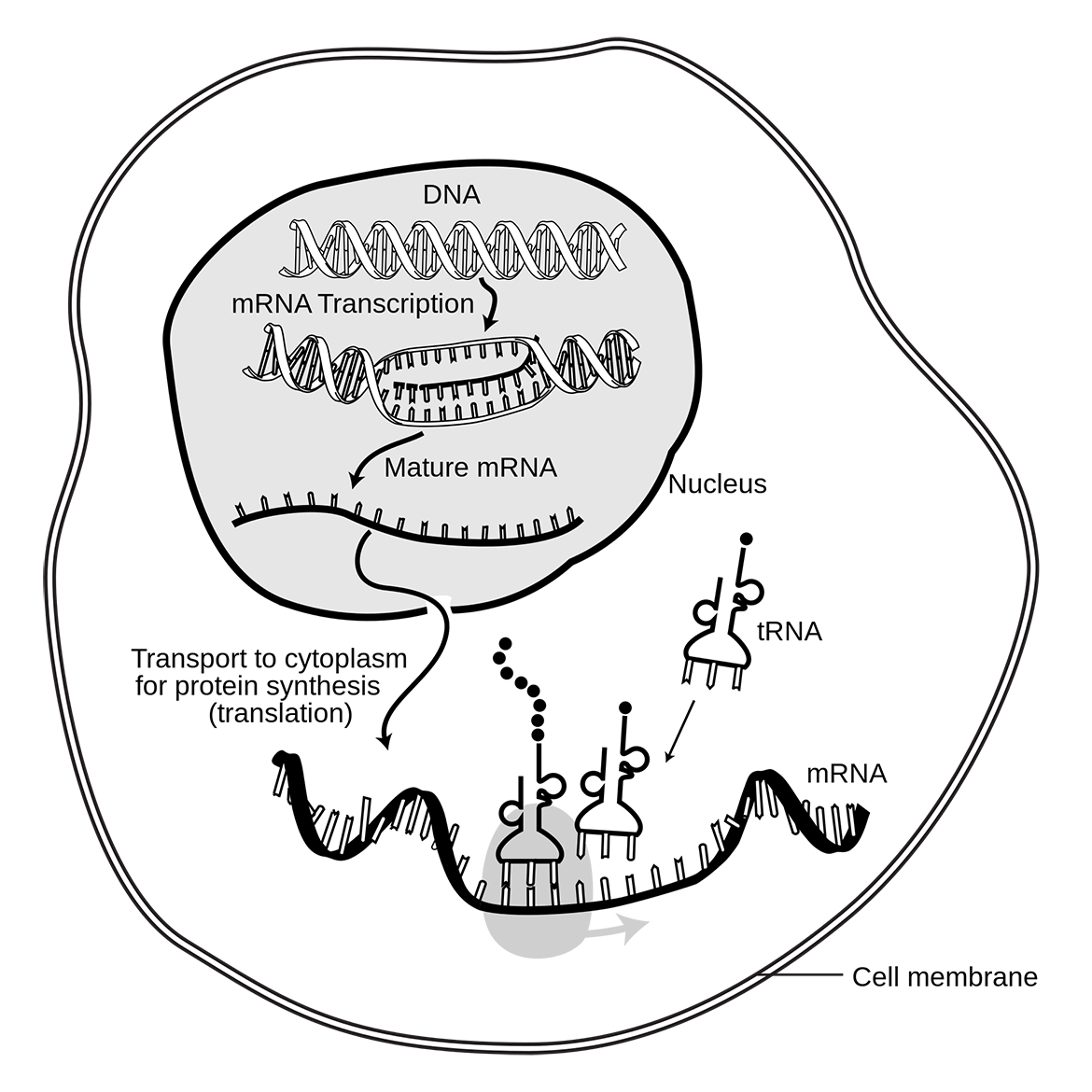Key takeaways
- Messenger RNA copies and carries instructions from the DNA in the cell's nucleus to where protein is made. More mRNA usually means more protein — unless the mRNA is unstable and breaks down too quickly.
- Mutations in the DNA can affect the production and stability of mRNA, which influences how much protein a cell produces and a person's risk of disease.
- UCLA researchers have identified genetic mutations that influence mRNA stability. Many of these genes are involved in immune system function.
A pizza shop with 30 delivery people ought to be able to deliver a lot of pizzas — if their cars don't break down on the way. Likewise, genes that produce a lot of messenger RNA (mRNA) molecules can build a lot of proteins — if these molecules don't fall apart before the job gets done.
Inside almost every human cell is DNA, a comprehensive instruction manual for building and maintaining the body. Genes in that manual contain the instructions for making proteins. But those instructions must travel from the cell's nucleus, where the DNA lives, to the outer region of the cell — the cytoplasm — where proteins are actually made.
That's where mRNA comes in. Like a messenger, it copies the instructions from the DNA in the nucleus and carries them out to the protein-making machinery. More mRNA typically means more protein — unless the mRNA is unstable and breaks down too quickly.

"Every mRNA has to die in the end," says Xinshu Xiao, a professor of integrative biology and physiology at UCLA and senior author of a new paper published in Nature Genetics. "It's produced, it does its job, and then it's destroyed. But most research has focused on how mRNA is made. Much less attention has been paid towards how fast it's degraded — and that's just as important."
Both the production and stability of mRNA can be affected by mutations in the DNA, which are commonly referred to as genetic variants. These variants can affect how much protein a cell makes, and in turn, influence a person's risk of disease. But figuring out whether a variant affects how much mRNA is made — or how long it survives — has been a major challenge.
Led by UCLA doctoral student Elaine Huang, Xiao's team developed a computational tool called RNAtracker, which is freely available. The software allows researchers to pinpoint whether a gene is being regulated through changes in mRNA production or in mRNA stability. In pizza terms: Is the problem that not enough pizzas are being made or that the delivery cars are breaking down? RNAtracker helps scientists trace the breakdown.
The researchers applied RNAtracker to a publicly available dataset of 16 human cell lines, in which newly made mRNAs had been chemically labeled and tracked over time. This allowed them to identify genes whose stability varies due to specific mutations. Many of these genes were involved in immune system function — especially the innate immune system, the body's first line of defense against infections.
The team also found that several of the genetic variants linked to unstable mRNA had already been associated with autoimmune diseases in large-scale genetic studies.
"One insight from this project is that some disease-associated variants may be acting through effects on mRNA stability," said Xiao.
Using additional modeling, the researchers linked expression levels of these stability-regulated genes to diseases including allergic rhinitis, lupus, diabetes mellitus and multiple sclerosis. The findings suggest that mRNA stability — long overlooked — may be a key mechanism behind many immune-related diseases.
"Basic research like ours shifts the paradigm of what people focus on," said Huang. "For drug developers or researchers working on treatments, you can't target what you don't know is important. We are trying to bring attention to genetic variants that affect mRNA stability, which hasn't gotten the spotlight it deserves."
The research, which received funding from the National Institutes of Health, used publicly available data generated by ENCODE, an NIH-supported consortium.
"The NIH plays a critical role by supporting large-scale efforts like ENCODE," said Xiao. "They make it possible for researchers around the world to access massive datasets and make discoveries like ours."
Additional authors include: Ting Fu, Ling Zhang, Guan'ao Yan, Ryo Yamamoto, Sari Terrazas, Thuy Linh Nguyen, Carlos Gonzalez-Figueroa, Armen Khanbabaei, Jae Hoon Bahn, Rajagopal Varada, Kofi Amoah, Jonatan Hervoso, Michelle Paulsen, Brian Magnuson, Mats Ljungman and Jingyi Jessica Li.






